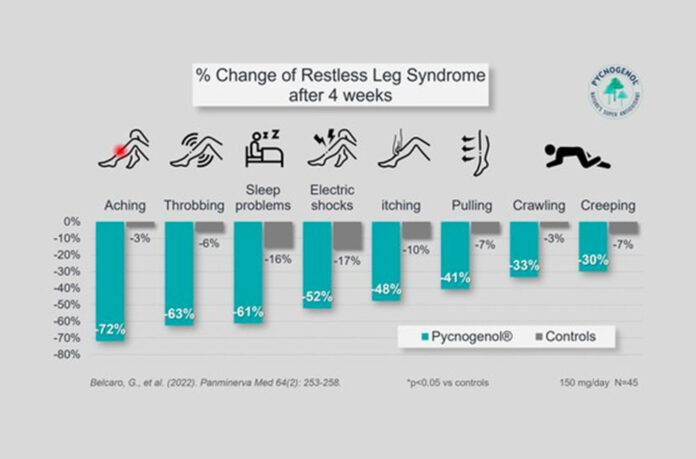The study, published in Panminerva Medica, tested 45 subjects with Restless Legs Syndrome. Twenty-one (21) subjects were supplemented with 150 mg of Pycnogenol® per day, while another 24 subjects followed a standard management routine in the control group. After four weeks, subjects in the Pycnogenol® group showed significant improvement in all prominent symptoms of Restless Legs Syndrome, including:
33 percent decrease in crawling (vs. 3 percent decrease in control group)
30 percent decrease in creeping (vs. 7 percent decrease in control group)
41 percent decrease in pulling (vs. 7 percent decrease in control group)
63 percent decrease in throbbing (vs. 6 percent decrease in control group)
72 percent decrease in aching (vs. 3 percent decrease in control group)
48 percent decrease in itching (vs. 10 percent decrease in control group)
52 percent decrease in electric shocks (vs. 17 percent decrease in control group)
61 percent decrease in sleep problems (vs. 16 percent decrease in control group)
Research indicates that as many as 22 percent of those with Restless Legs Syndrome also have venous insufficiency. While additional research is needed to determine the relationship between Restless Legs Syndrome and edema, this study found that 81 percent of subjects in the Pycnogenol® group improved their status of minimal edema.
Additionally, after four weeks, the need for pain management was significantly reduced for those in the Pycnogenol® group.
“Even when Restless Legs Syndrome is properly diagnosed, medication to treat the condition includes pharmaceuticals that increase dopamine in the brain, resulting in side effects like nausea and sleepiness. Opioids or narcotic medications may be used to relieve more severe symptoms and can be extremely addictive,” says Dr. Pescatore.
“Pycnogenol® is an all-natural solution. Decades of research and global market availability show this circulation booster is safe and effective and is especially recognized as an ingredient at the forefront of naturally improving blood circulation. This study now shows its effects specifically on symptoms related to Restless Legs Syndrome,” said Dr. Pescatore.






